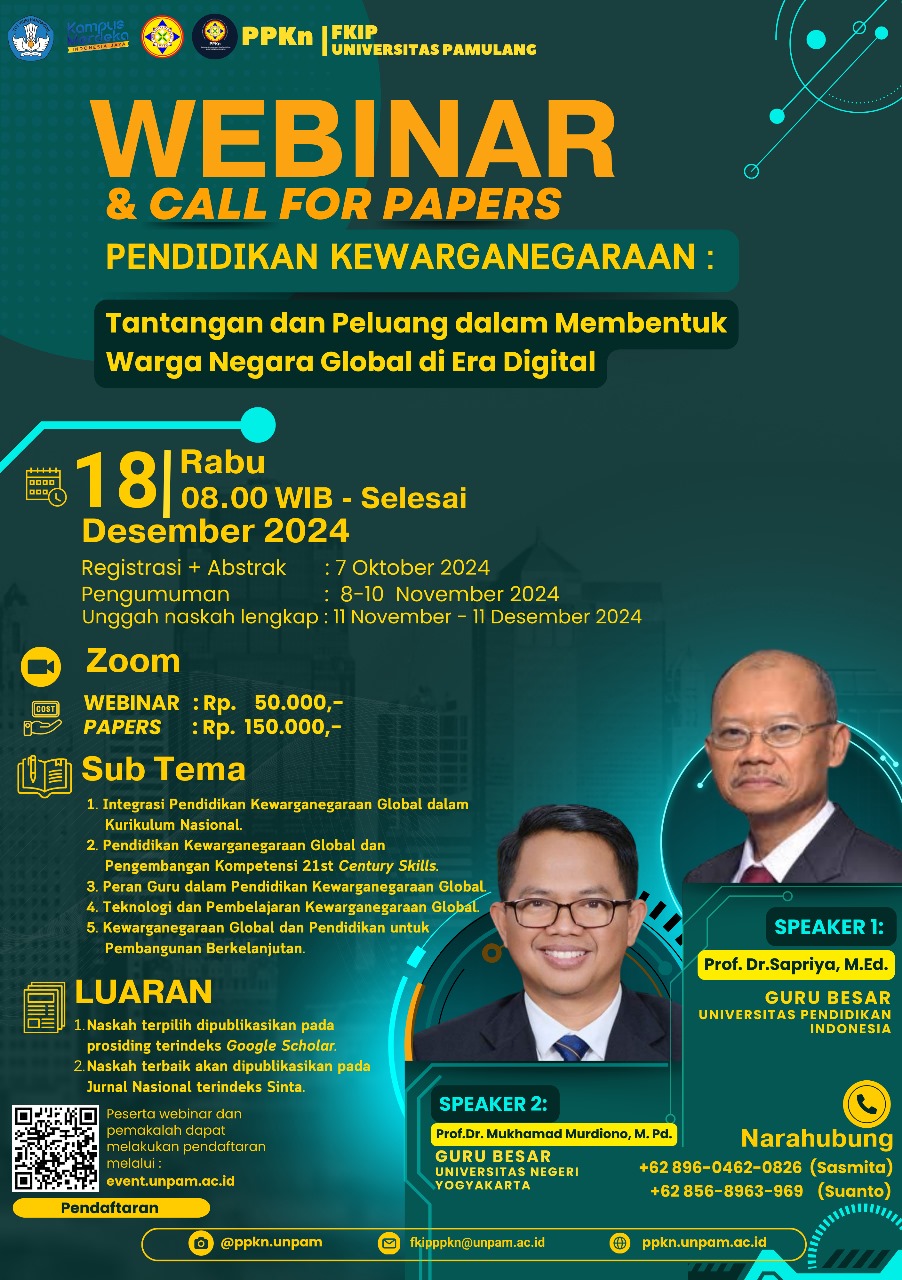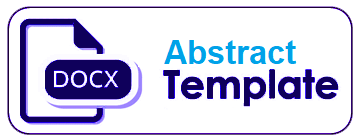PENGGUNAAN TEKNOLOGI DIGITAL DALAM MENINGKATKAN LITERASI KEWARGANEGARAAN GLOBAL
Keywords:
Teknologi digital, Kewarganegaraan Global, Era DigitalAbstract
Penggunaan teknologi digital telah menjadi kebutuhan mendesak dalam meningkatkan literasi kewarganegaraan global di era digital. Namun, rendahnya kesadaran peserta didik terhadap isu-isu global, seperti keberagaman, hak asasi manusia, dan lingkungan, diperburuk oleh keterbatasan literasi digital. Penelitian ini bertujuan untuk menganalisis efektivitas teknologi digital dalam meningkatkan literasi kewarganegaraan global di kalangan pelajar. Metode penelitian menggunakan pendekatan literature review sistematik, dengan analisis berbagai jurnal ilmiah, buku, dan dokumen resmi. Hasil penelitian menunjukkan bahwa teknologi digital mampu mendukung pembelajaran interaktif, memperkaya wawasan tentang isu-isu global, dan mendorong keterlibatan aktif peserta didik dalam masyarakat global. Namun, ketimpangan akses teknologi, kualitas konten digital, dan penyebaran informasi yang tidak valid menjadi tantangan utama. Kesimpulannya, integrasi teknologi digital dalam pendidikan harus disertai dengan kebijakan yang mendukung akses yang merata, pelatihan pendidik, dan pengembangan kurikulum berbasis nilai kewarganegaraan global. Penelitian ini memberikan kontribusi baru dalam memahami peran teknologi digital untuk membangun generasi muda yang sadar dan bertanggung jawab secara global.
References
Agir, N., & Mohd Matore, M. E. @ E. (2022). Literasi dan Kewarganegaraan Digital: Konsep dan Strategi Implementasi dalam Pendidikan di Malaysia. Malaysian Journal of Social Sciences and Humanities (MJSSH), 7(3), e001367. https://doi.org/10.47405/mjssh.v7i3.1367
Baraka, K. (2024). Digital Divide and Social Inequality. International Journal of Humanity and Social Sciences, 3(3), 30–45. https://doi.org/10.47941/ijhss.2083
Booth, A., Papaioannou, D., & Sutton, A. (2012). Systematic approaches to a successful literature review. Sage.
Bosov, A., Selivanova, N., & Pustylnik, Y. (2024). Digital Educational Content for a Modern Lesson: Quality Assessment Technology. Education and Self Development, 19(3), 98–113. https://doi.org/10.26907/esd.19.3.08
Choczyńska, A. (2024). Intersectional digital inequality in Indonesia. Insights into Regional Development, 6(3), 11–22. https://doi.org/10.70132/a2853658265
Duque, R. D. C. S., Monteiro, R. R., Loureiro, V. J. S., Nascimento, I. J. B. M. F. D., Placido, R. L., Silva, C. J. D., & Saraiva, M. D. S. G. (2024). Training teachers to use technology: Artificial Intelligence (AI) and the new challenges facing education. In Themes focused on interdisciplinarity and sustainable development worldwide V. 02 (1st ed.). Seven Editora. https://doi.org/10.56238/sevened2024.003-019
Farmer, L. S. J. (2020). Educating with Technology for Youth’s Civic Engagement. In M. J. Bishop, E. Boling, J. Elen, & V. Svihla (Eds.), Handbook of Research in Educational Communications and Technology (pp. 401–420). Springer International Publishing. https://doi.org/10.1007/978-3-030-36119-8_18
Gökoğlu, S., & Özhan, Ş. Ç. (2024). Digital Literacy and Digital Citizenship: A Comprehensive Overview. In M. Pucelj & R. Bohinc (Eds.), Advances in Human and Social Aspects of Technology (pp. 1–28). IGI Global. https://doi.org/10.4018/979-8-3693-7914-1.ch001
Gonzalez-Mohino, M., Rodriguez-Domenech, M. Á., Callejas-Albiñana, A. I., & Castillo-Canalejo, A. (2023). Empowering Critical Thinking: The Role of Digital Tools in Citizen Participation. Journal of New Approaches in Educational Research, 12(2), 258–275. https://doi.org/10.7821/naer.2023.7.1385
Hakim, A. N., & Yulia, L. (2024). DAMPAK TEKNOLOGI DIGITAL TERHADAP PENDIDIKAN SAAT INI. 3.
Karuru, P., Sipahelut, J., Riyanti, R., Saleh, M., & Makulua, K. (2024). Development of Technology-Based Learning Models to Enhance Critical Thinking Skills in Education Students. Global International Journal of Innovative Research, 2(1), 330–335. https://doi.org/10.59613/global.v2i1.53
Malik, K. (2024). Integrating Digital Citizenship Education in the Contemporary Educational Ecosystem. In K. Sood, P. Kalia, S. Grima, & A. Chaudhary, Digital Analytics Applications for Sustainable Training and Education (1st ed., pp. 357–376). Apple Academic Press. https://doi.org/10.1201/9781032713366-25
Matusevych, T. (2018). Civic Education in the Digital Age: Challenges and Development Prospects (Review of the Workshop “Digitization and Civic Education”, September 3-4, 2018, Marseilles). Filosofiya Osvity. Philosophy of Education, 23(2), 265–269. https://doi.org/10.31874/2309-1606-2018-23-2-265-269
Mulyani, H., Komalasari, K., Mitra Permatasari, Bribin, M. L., & Suriaman, S. (2024). Transformasi Pendidikan Kewarganegaraan Global di Era Abad 21: Analisis Implementasi dan Tantangan. Jurnal Kewarganegaraan, 21(1), 88. https://doi.org/10.24114/jk.v21i1.55115
Pleskach, M. (2024). The Concept and Role of Digitalization in the Realization of the Human Right to Education: A Comparative Legal Perspective. 2024 14th International Conference on Advanced Computer Information Technologies (ACIT), 858–865. https://doi.org/10.1109/ACIT62333.2024.10712470
Prasastiningtyas, W., Ubaidillah, A. Z., Aprianti, I., & Nurfadilah, L. (2024). IMPROVING LITERACY IN THE DIGITAL AGE: UNLEASHING CRITICAL THINKING POTENTIAL. TOPLAMA, 2(1), 18–27. https://doi.org/10.61397/tla.v2i1.218
Saleem, A., Deeba, F., & Raza, M. A. (2022). Global Citizenship Education: A New Approach to Global Citizenship Development. PERENNIAL JOURNAL OF HISTORY, 3(2), 392–409. https://doi.org/10.52700/pjh.v3i2.131
Santos, S. M. A. V., Dias, E. B., Carvalho, F. M. D. S., Da Costa, I. T., Freire Junior, J. D. M., Meroto, M. B. D. N., Pedra, R. R., & Santos, U. C. (2024). On the waves of emerging technologies: A look at multimedia in classrooms. CONTRIBUCIONES A LAS CIENCIAS SOCIALES, 17(2), e4986. https://doi.org/10.55905/revconv.17n.2-021
Schmitt, J. B., Baake, J., & Kero, S. (2024). What means civic education in a digitalized world? Frontiers in Psychology, 15, 1257247. https://doi.org/10.3389/fpsyg.2024.1257247
Schulz, W., Fraillon, J., Losito, B., Agrusti, G., Ainley, J., Damiani, V., & Friedman, T. (2023). IEA International Civic and Citizenship Education Study 2022 Assessment Framework. Springer International Publishing. https://doi.org/10.1007/978-3-031-20113-4








